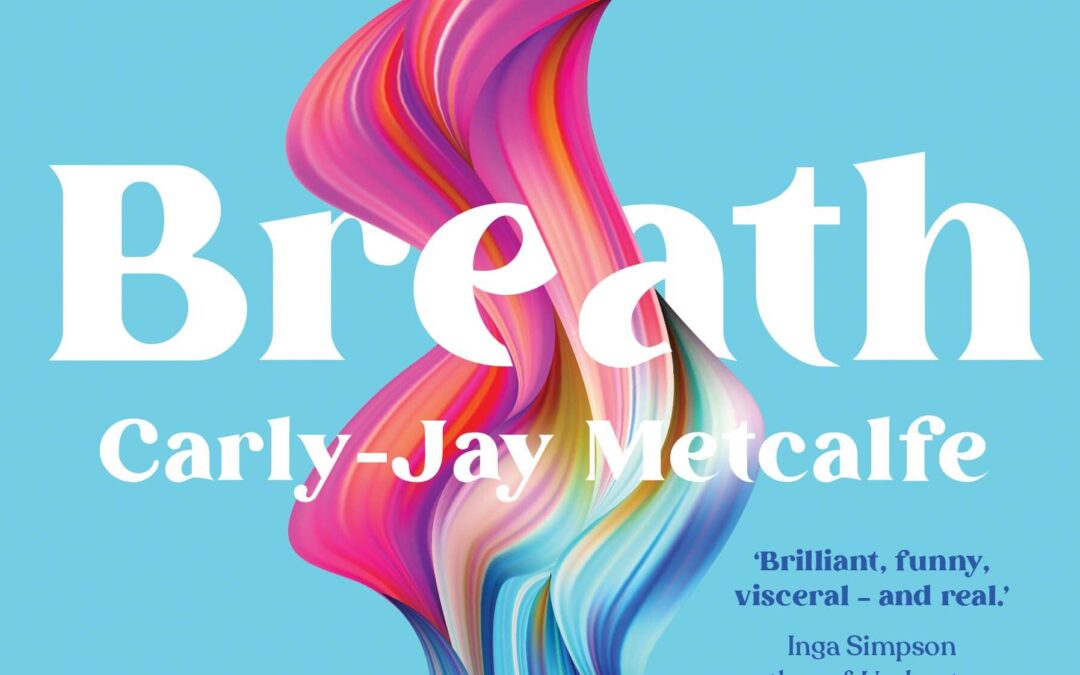I’m a firm believer that books often come into your hands at exactly the time you need them. Carly-Jay Metcalfe’s memoir Breath (UQP 2024) is hopeful, funny, exhilarant, optimistic and wise (what I need to read right now) although the content is raw and visceral, covering death, chronic illness, addiction and survivor’s guilt (some of which I am experiencing right now). It is a finely balanced scale of trauma and triumph, and everything in between. It is brutally honest, scathing, compassionate, insightful, authentic and at times extremely funny – the kind of gallows humour that chronically ill or dying people need to escape being chronically depressed and sad.
Metcalfe tears open her chest and invites the reader to examine the messiness of the human body, to reflect on what constitutes a good or worthwhile life, and to be grateful for every precious breath of air that continues to allow the blood to pulse through our veins. Memoirs written by people who have come close to death are tinged with a special perceptiveness that perhaps only occurs during those critical moments. Metcalfe has had a lifetime of such moments, growing up with the genetic disease cystic fibrosis (an illness that touches my own family). One delineating moment was when she was 21 years old: the before and after of receiving her double lung transplant, which itself introduced a host of other medical and ethical problems. She struggled with an opioid addiction and describes the highs and lows of this with courage and candour. And she shows the reader her life now, working with other people who are dying, a death doula, a kind of midwife for those who are coming to the end of their lives, some old and some way too young, some ready and some fighting to the end, some peaceful and content and some angry and frustrated.
Breath will obviously resonate with anyone suffering from a chronic illness, or living with someone who is dying. But it also has general appeal for the incredible insightfulness with which Metcalfe confronts difficult and uncomfortable topics, and the generosity of her knowledge, experience and variously held opinions about these issues. This is a book that will deepen your compassion, no matter what your life situation.
She also covers the practical and ethical complexities of organ donation: the life-long immunosuppressants required to cope, the idea of carrying around a vital piece of someone else in your own body, the trauma that led to that donor making an organ available, the terribly cruel circumstances and subsequent discussions that must have led that person’s family to decide to donate, the anxious wait on the donor list, the thrill of receiving a page on your beeper to advise you that a match has been found, the delirium of receiving healthy organs to replace your own diseased and non-functioning ones, the daily guilt versus thankfulness that an organ recipient feels towards their (probably) unknown donor. So many different aspects to this complicated area. Certainly this book has boosted my already positive response to organ donation and the magical difference it can make to the lives of ordinary people.
Perhaps most importantly of all, Breath invites a more open discussion around death and dying, the process and how we all deal with it. There were (interestingly) so many points or topics in this book that resonated with me. I was constantly messaging the author as I was reading, saying ‘that happened to me!’ or ‘that is what my family member suffered!’ and these strange synchronicities continued until the final pages, where Metcalfe discusses trying to establish a Brisbane chapter of Tender Funerals, which operates in the southern states. For the last 10 years or so, a group of dedicated and passionate people have been trying to start this in Queensland – a different kind of death experience, focussed on family-led and traditional processes rather than the cookie cutter mega funeral industry that most of us endure. My close friend who died of brain cancer less than six months ago had also been instrumental in this endeavour; just another coincidence (for me) in this warm and tender memoir.
Breath traverses rage, anger, frustration, love, tenderness, fragility, honesty, survival, death, humour, wit, grief, loss, guilt, addiction, hope, lust, the medical system, anxiety, friendship, family, sacrifice and hope. It is about what we would do for our children. What we might give to a stranger. How being chronically ill might challenge every view we have of ourselves but ultimately demand of us that we face the discomfiting but inevitable certainty that death will come to us all, and that the questions that should consume us are not how long do we live, but how well do we live, and how far kindness and optimism go towards the creation of a fulfilling and well-lived life, no matter our age or circumstances. A remarkable and very moving memoir.

